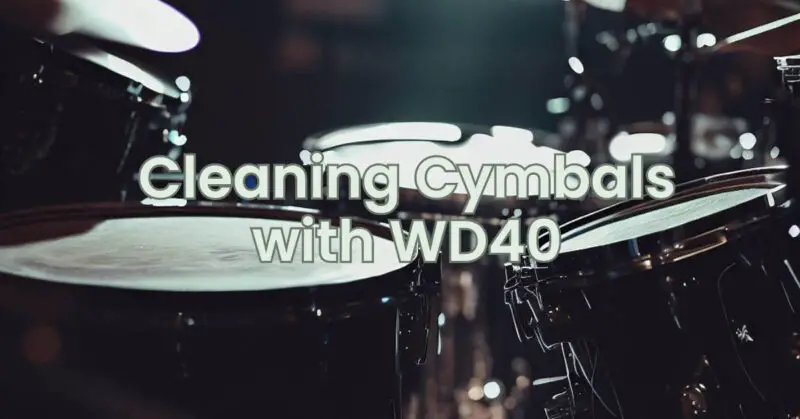Cymbals, integral components of a drum set, require regular maintenance to keep them looking and sounding their best. While there are various methods for cleaning cymbals, some drummers have considered using WD-40 as a cleaning agent. However, it’s important to understand the potential risks and drawbacks associated with this approach. In this article, we’ll explore the use of WD-40 for cleaning cymbals and suggest alternative methods for maintaining their shine and sound quality.
What is WD-40? WD-40 is a popular multi-purpose product known for its lubricating and penetrating properties. It is primarily used for tasks such as loosening rusted parts, preventing corrosion, and providing temporary lubrication. While it can be effective for certain applications, using WD-40 on cymbals requires careful consideration.
Risks of Cleaning Cymbals with WD-40: Using WD-40 on cymbals poses several risks that can negatively impact their appearance and sound:
- Removal of protective coating: Cymbals typically have a protective coating, such as lacquer or clear finish, that helps preserve their appearance and sound quality. WD-40, being a solvent-based product, can potentially strip away this protective coating, leaving the cymbal vulnerable to oxidation, tarnishing, and even damage.
- Altered sound quality: Cymbals are designed to produce specific tonal qualities and sound characteristics. Applying WD-40 to the cymbal’s surface can change its resonance, sustain, and overall sound, resulting in an undesirable tonal shift.
- Residue buildup: WD-40 leaves behind a residue that can be challenging to remove completely. This residue can accumulate over time, attracting dirt, dust, and other contaminants. This buildup can ultimately affect the cymbal’s appearance and potentially impact its sound quality.
Alternative Methods for Cleaning Cymbals: To clean your cymbals effectively without the risks associated with WD-40, consider the following alternative methods:
- Mild soap and water: Fill a basin or sink with warm water and add a small amount of mild dish soap or a cymbal cleaner specifically designed for cleaning cymbals. Gently wipe the cymbal’s surface using a soft cloth or sponge. Rinse thoroughly with clean water and dry immediately with a soft cloth.
- Cymbal cleaner: Invest in a cymbal cleaner that is specifically formulated for the task. These cleaners are designed to remove dirt, grime, and oxidation without damaging the cymbal’s surface or altering its sound. Follow the manufacturer’s instructions for best results.
- Lemon juice and baking soda paste: Create a paste by combining lemon juice and baking soda until it forms a thick consistency. Apply the paste to the cymbal’s surface using a soft cloth, and gently rub in circular motions. Rinse thoroughly with water and dry immediately.
- Microfiber cloth maintenance: Regularly wipe down your cymbals after each playing session using a clean, dry microfiber cloth. This helps remove sweat, oils, and debris, reducing the need for extensive cleaning.
Preventive Measures and Maintenance Tips: To keep your cymbals in excellent condition and reduce the frequency of cleaning, consider these preventive measures:
- Proper handling: Handle cymbals with clean hands or wear gloves to minimize contact with oils and sweat that can transfer onto the cymbal’s surface.
- Cymbal sleeves or dividers: Use protective sleeves or dividers when storing or transporting your cymbals. These help prevent them from rubbing against each other, reducing the likelihood of scratches or damage.
- Avoid excessive force: Be mindful of your playing technique to avoid striking the cymbals with excessive force, as this can cause cracks or premature wear.
In conclusion, while WD-40 is a versatile product for various applications, it is not recommended for cleaning cymbals due to the potential risks of removing the protective coating and altering the sound quality. Instead, opt for safer alternatives such as mild soap and water, specialized cymbal cleaners, or natural cleaning solutions. By adopting proper maintenance techniques and preventive measures, you can keep your cymbals looking and sounding their best for years to come.


